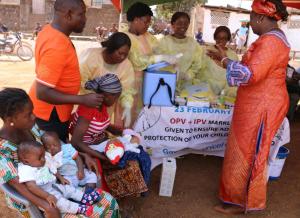Sierra Leone maximizes protection against polio with new vaccine launch
FREETOWN, February 23 2018 --- Today Sierra Leone officially introduced injectable polio vaccine (or IPV) into its routine immunization programme to maximize protection against polio. IPV is used in many countries around the world to prevent the debilitating disease, and will now be available free of cost alongside the oral vaccine at health facilities across Sierra Leone.
The new vaccine’s introduction is led by the Ministry of Health and Sanitation with support from the WHO Global Polio Eradication Initiative (GPEI), UNICEF, Gavi the Vaccine Alliance and the vaccine manufacturers.
“The principal strategy for polio eradication and keeping our children safe from the disease is ensuring that every child, everywhere, gets their vaccines,” said Alexander Chimbaru, Officer in Charge of the World Health Organization Country Office in Sierra Leone. “Alongside the oral vaccine, IPV will provide children in Sierra Leone with the best possible protection against polio.”
In 1988 when the WHO GPEI was launched, polio paralyzed approximately 10 children every 15 minutes in over 130 countries of the world. Today, the collective global effort to end the disease in every part of the world has resulted in only 22 cases in just two countries in 2017, making it a new historical low.The last confirmed polio case in Sierra Leone was reported in 2010. Since then increased surveillance activities for the disease has been ongoing with support from WHO and other partners, alongside efforts to expand vaccination coverage across all of the country’s 14 districts.
“As part of our effort as a Ministry to advance child health in Sierra Leone, there are currently eight childhood vaccines with twelve antigens in the National Immunization Programme which are helping to save the lives of our children against vaccine preventable diseases”, explained Madina Rahman, Deputy Minister of Health and Sanitation. “And today, we feel very proud to introduce the IPV for the first time as another critical lifesaving intervention, which was made possible with the unwavering support of our partners”, she added.
Partners also stressed the need for health workers to ensure effective storage of the vaccines, and for communities and partners to continue mobilizing all parents and caregivers to take their children to get their routine vaccinations on time, for protection against different life-threatening and debilitating diseases.
